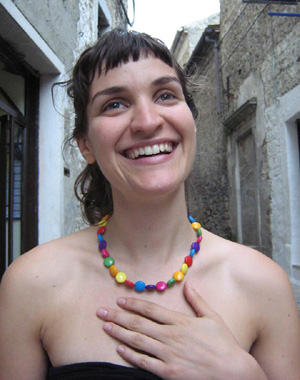Any journey begins with a single step. If the journey is into yourself, don’t be afraid to enter the labyrinth! Relief, transformation and silence await you at its exit.
“CREAtorium – a labyrinth inside a labyrinth” is an exclusive theatrical experience where anything is possible, an event when the audiences are not passive onlookers but active participants along with the actors. And if they place their trust in them, spectators shall go through a momentous experience of losing and finding themselves in the Labyrinth of Endless Opportunity.
The show is the work of the Sensory Theatre, Sofia – a test lab that stages performances using unorthodox space like abandoned factories, museums, shopping malls or out in the open. In these performances the boundaries between the classical roles of playwright and director are blurred and the elements of the story are born of a collective creative process. The CREAtorium is on at the National Palace of Culture, though not on any particular stage but in-between floors, in corridors, crannies and mysterious spaces. Upon entering the sensory labyrinth the outside world disappears and with every step taken the sense of here, now, before, then, I, others is changed.
What else does sensory theatre mean and what makes it different from traditional theatre? The answer from Zlatina Toleva, organizer and actress:
 “There is a big difference – in traditional theatre the audience sits still, hidden away in the dark and anonymous, watching what is happening on the stage. Whereas in the theatre of the sensory labyrinth the audience is the protagonist, moving around, meeting the actors, spectators are expected to interact and lay down their own path and experience across the maze. They are not passive observers but active co-authors.”
“There is a big difference – in traditional theatre the audience sits still, hidden away in the dark and anonymous, watching what is happening on the stage. Whereas in the theatre of the sensory labyrinth the audience is the protagonist, moving around, meeting the actors, spectators are expected to interact and lay down their own path and experience across the maze. They are not passive observers but active co-authors.”
Each spectator experiences an individual adventure of sensory provocation – auditory, tactile, olfactive, visual, gustatory.
“Spectators can embark on a long journey across the labyrinth, enter the darkness, open up their senses and savour the fragrances, trustful of where they are being guided to. That is a very personal experience.”
Zlatina Toleva adds that every show spawns as many storylines as there are people in the labyrinth. The show unfolds in each participant’s mind’s eye, triggering individual associations and memories.
“It is something each person brings to the surface for himself,” says Zlatina Toleva. “What the message will be for each individual depends on what provocations he or she reacts to most. The sensory labyrinth theatre is an invitation to push our own comfort boundaries, our safe zone, see how far we can go and find out something new about our own selves. What we have aimed to do is create conditions for people to trust us and to open up. This means helping them, as we frequently follow beaten paths and do things mechanically or out of inertia. The sensory theatre is an experience during which we never know what to expect, where everything is new and unfamiliar and it is much easier to look into our minds and be more attentive here and now.”
The key word here is “experience”.
As a matter of fact, sensory theatre is an ancient practice, brought to Europe by Columbian anthropologist Enrique Vargas. In Bulgaria it was first presented in 2006 thanks to one of his students, director and researcher Iwan Brioc, who trained the first group of Bulgarian actors in the method of sensory theatre. Today he has a number of shows and social and artistic projects to his name, thanks to artists in different spheres – actors, directors, painters, scenographers, musicians, even psychologists.
English version: Milena Daynova
The Gala Concert of the National Ballet of El Salvador will take place today at 16.00 in the State Opera House in Stara Zagora as part of the programme of the 54th International Festival of Opera and Ballet Arts . The founder and director of..
The ninth edition of the initiative Poetry in the Metro opens today and lasts until 23 December. The project was initiated by the Polish Cultural Institute in Sofia. It includes poems by 20 European writers. They will be displayed on panels..
Awakener/enlightener - a person who, through his actions, ideas or creative work, awakens the spirit of the people, preserves and spreads national identity, culture and education. In Bulgarian history, this term is most often associated with the period of..
The Bulgarian film "Tarika" , directed by Milko Lazarov, won the Best Film award in the international competition category at the 30th Kolkata..
Bulgarian actress Maria Bakalova has appeared on the cover of Vogue CS . ‘’ One of my biggest dreams just came true. I’m so overexcited to share with..
"In the book ‘Bulgaria I s M y S ong’ Iliya Lukov reveals himself to us as a great patriot who has done a lot for..

+359 2 9336 661
